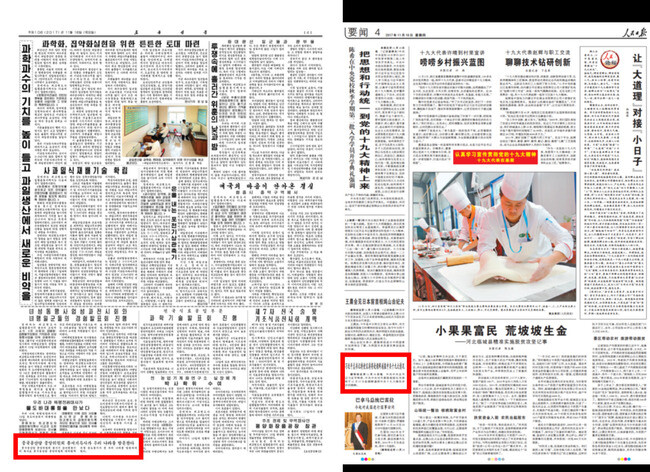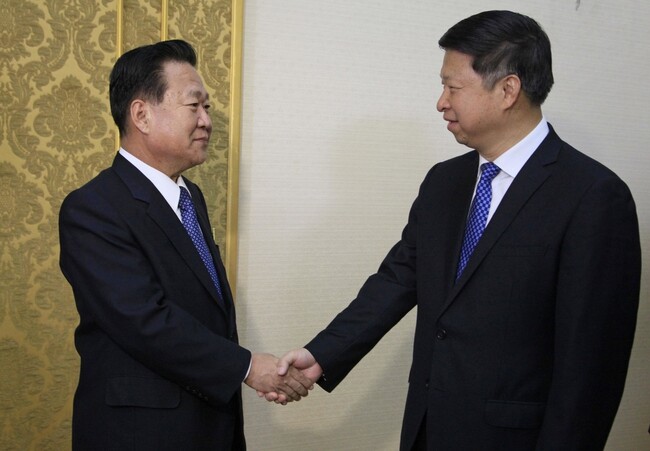hankyoreh
Links to other country sites 다른 나라 사이트 링크
North Korean, Chinese media downplay special envoy’s visit to Pyongyang

On Nov. 16, the day before Song Tao, head of the International Liaison Department of the Communist Party of China (CPC) was supposed to visit North Korea as Chinese President Xi Jinping’s special envoy, news about the visit ran in both the People’s Daily, the CPC’s official newspaper, and the Rodong Sinmun, the official newspaper of the North Korean Workers’ Party (KWP). As if the two sides had agreed upon it in advance, they both printed the same sentence-long report on page four that had also been announced simultaneously the previous day on Xinhua News and the Korean Central News Agency (KCNA).
Short as the article is, the fact that North Korean and Chinese state-run newspapers reported the story at the same time, and in the same way, means that prior communication took place between the two sides. Both are acting with considerable caution, analysts believe. “One time, the Rodong Sinmun ran a front-page story about a Chinese state-run research institute visiting the North for academic exchange. The fact that the special envoy’s visit received so little coverage suggests that, at the moment, the visit is not being accorded much importance,” said one Chinese expert. In this person’s view, Pyongyang appears to be advising against ascribing too much significance to Song’s visit for now.
On the first day of his visit, Song met KWP Central Committee Vice Chairman Choe Ryong-hae, the second most powerful person in the North Korean regime. Other people were present at the meeting, but the matters discussed were not immediately reported. Song was welcomed at the airport by Ri Chang-gun, vice director of the KWP International Department.
In May 2016, Song met Ri Su-yong, vice chair of the KWP’s Central Committee, whom North Korea sent to China as a special envoy following the 7th KWP Congress. The fact that Song has limited experience with North Korea and is a member of the Central Committee, which makes him lower in rank than Li Jianguo, the Politburo member who was dispatched as a special envoy in 2012, can be taken as a sign that ties between the two countries have frayed.
But the visit still carries no small amount of weight since it comes at a time when high-level exchange between North Korea and China has been basically nonexistent for more than two years. “The main purpose” of Song’s visit to North Korea, according to China’s Ministry of Foreign Affairs, “is to report the results of the 19th National Congress of the Communist Party of China and to exchange opinions on matters of joint interest between our two countries and our two parties.” This suggests that the visit is not a mere formality.
Song is also likely to deliver a personal letter from Chinese President Xi Jinping to North Korean leader Kim Jong-un. Liu Yunshan, the special envoy sent to North Korea after the 17th Party Congress in 2007, delivered a verbal message from former Chinese president Hu Jintao to former North Korean leader Kim Jong-il, while Li Jianguo, the special envoy sent after the 18th Party Congress in 2012, delivered a personal letter from Xi to Kim Jong-un. This time, the message is likely to communicate China’s new concept of international relations developed through the party congress and China’s position on the North Korean nuclear issue that was recently clarified through the China-US summit.

Because of the situation and the timing, hopeful voices are also being raised in China. “Song’s visit comes at a time when related countries are narrowing their differences about solutions to the North Korean nuclear issue,” said an editorial in the state-run China Daily. This newspaper reminded readers that South Korean President Moon Jae-in and Chinese President Xi Jinping had voiced their support for the peace and stability of the Korean Peninsula during their summit.
Since Song’s visit follows on the heels of summits between South Korea and the US and between the US and China and since North Korea has now gone 63 days without launching a missile or committing another provocation, attention is turning to whether the visit will create an opportunity for shifting to a phase of dialogue between North Korea and the US. While it’s unclear when such a shift could occur, US State Department Special Representative for North Korea Policy Joseph Yun reportedly said that North Korea suspending provocations for 60 days could be taken as a signal for resuming dialogue. If Song’s visit to North Korea concludes with few results, however, there is a considerable possibility that tensions could continue or worsen.
By Kim Oi-hyun, Beijing correspondent
Please direct questions or comments to [english@hani.co.kr]

Editorial・opinion
![[Column] Season 2 of special prosecutor probe may be coming to Korea soon [Column] Season 2 of special prosecutor probe may be coming to Korea soon](https://flexible.img.hani.co.kr/flexible/normal/500/300/imgdb/original/2024/0426/3317141030699447.jpg) [Column] Season 2 of special prosecutor probe may be coming to Korea soon
[Column] Season 2 of special prosecutor probe may be coming to Korea soon![[Column] Park Geun-hye déjà vu in Yoon Suk-yeol [Column] Park Geun-hye déjà vu in Yoon Suk-yeol](https://flexible.img.hani.co.kr/flexible/normal/500/300/imgdb/original/2024/0424/651713945113788.jpg) [Column] Park Geun-hye déjà vu in Yoon Suk-yeol
[Column] Park Geun-hye déjà vu in Yoon Suk-yeol- [Editorial] New weight of N. Korea’s nuclear threats makes dialogue all the more urgent
- [Guest essay] The real reason Korea’s new right wants to dub Rhee a founding father
- [Column] ‘Choson’: Is it time we start referring to N. Korea in its own terms?
- [Editorial] Japan’s rewriting of history with Korea has gone too far
- [Column] The president’s questionable capacity for dialogue
- [Column] Are chaebol firms just pizza pies for families to divvy up as they please?
- [Column] Has Korea, too, crossed the Rubicon on China?
- [Correspondent’s column] In Japan’s alliance with US, echoes of its past alliances with UK
Most viewed articles
- 1[Column] Season 2 of special prosecutor probe may be coming to Korea soon
- 2No good, very bad game for Korea puts it out of Olympics for first time since 1988
- 3‘We must say no’: Seoul defense chief on Korean, USFK involvement in hypothetical Taiwan crisis
- 4Division commander ordered troops to enter raging flood waters before Marine died, survivor says
- 5Is Japan about to snatch control of Line messenger from Korea’s Naver?
- 6Korea’s 1.3% growth in Q1 signals ‘textbook’ return to growth, says government
- 7Is N. Korea threatening to test nukes in response to possible new US-led sanctions body?
- 8[Editorial] Korea’s surprise Q1 growth requires objective assessment, not blind fanfare
- 9[Editorial] New weight of N. Korea’s nuclear threats makes dialogue all the more urgent
- 10[Editorial] In the year since the Sewol, our national community has drowned